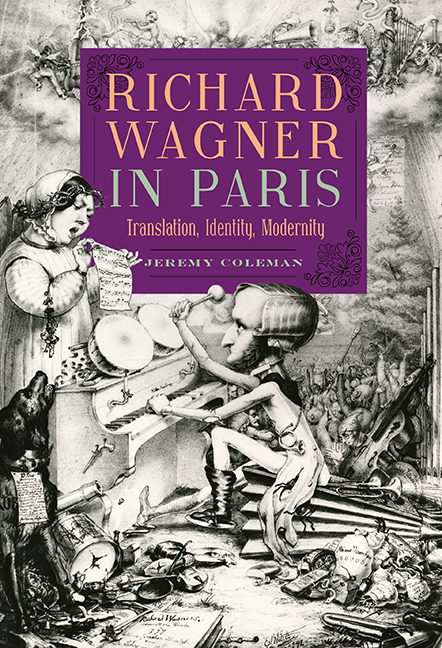Book contents
- Frontmatter
- Dedication
- Contents
- List of Illustrations
- List of Music Examples
- Note on the Text
- Acknowledgements
- Abbreviations
- Introduction: Wagner Against the Grain
- PART I PARIS YEARS, 1839–42
- PART II DRESDEN AND ZURICH, 1842–52
- PART III PARIS YEARS, 1859–61
- Conclusion: Universality at the Crossroads
- Bibliography
- Index
Conclusion: Universality at the Crossroads
Published online by Cambridge University Press: 25 March 2020
- Frontmatter
- Dedication
- Contents
- List of Illustrations
- List of Music Examples
- Note on the Text
- Acknowledgements
- Abbreviations
- Introduction: Wagner Against the Grain
- PART I PARIS YEARS, 1839–42
- PART II DRESDEN AND ZURICH, 1842–52
- PART III PARIS YEARS, 1859–61
- Conclusion: Universality at the Crossroads
- Bibliography
- Index
Summary
TAKEN as a whole, Wagner's relationship with Paris from the beginning until 1861 amounts to a series of failures. Even after he claimed to have rejected Paris for good following his own rejection there in the early 1840s, he continued perennially to seek major success on its operatic stages and the international recognition that it promised. Histories of French Wagner reception have typically posited Wagner's 1859–61 Paris period as a starting-point, recounting Wagner's earlier Paris engagements only to dismiss them as little more than a curious preface of ultimately little consequence. Normatively an emphatic beginning to histories of French Wagner reception, the year 1861, working as an axis of reflection, has served this book as an end-point to a selective account and interpretation of Wagner's own Parisian entanglements.
With the debacle of the Paris Tannhäuser that year, Wagner garnered notorious celebrity on an unprecedented scale. Consequently, he never again attempted a theatrical success in Paris or sought its acceptance or approval in the way he had previously. Indeed, it was during the 1860s and 1870s that his once complex and mutable relationship with Paris ossified into a more one-dimensional Francophobia that mirrored the polemical hyperbole which characterised his French reception during the same period. To take one example, his article “Was ist deutsch?”, written at the end of 1865 in the first flush of patronage from Ludwig II, contained the following passage:
Romanic, Gallic, French legends and books the German translates for himself, and whilst the Latins, Gaels and French know nothing of him, he keenly studies all their ways. But his is no mere idle gaping at the foreign, as such, as purely foreign; he wills to understand it as “German”. He renders the foreign poem into German, to gain an inner knowledge of its content. Herewith he strips the foreign of its accidentals, its externals, of all that to him is unintelligible, and makes good the loss by adding just so much of his own externals and accidentals as it needs to set the foreign object plain and undefaced before him.
Advocacy of ethnocentric “Weltliteratur” here assumed the character of the imperialist domination of others as well as the cleansing of impurities, although Wagner apparently did not relate this notion of literary translation to music.
- Type
- Chapter
- Information
- Richard Wagner in ParisTranslation, Identity, Modernity, pp. 169 - 178Publisher: Boydell & BrewerPrint publication year: 2019



